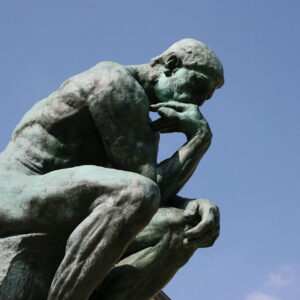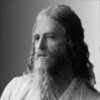A learned professor wished to cross the river, so he engaged the services of a common ferryman. As the ferryman rowed his small craft, the professor asked his opinion on the government’s economic policy. The ferryman apologized to the professor, explaining that he was an uneducated man who had never learned the principals of economics. “A pity,” exclaimed the professor, “for without a knowledge of economics one cannot succeed in the field of investment. My dear man, you have wasted a quarter of your life.”
To continue the conversation, the professor asked the ferryman what he thought of the latest styles of clothing that people were wearing. The ferryman again apologized, as he was forced to explain that he was a poor man who did not have the resources needed to keep abreast of fashion. “A shame,” pronounced the professor, “for without a knowledge of how to dress appropriately, one cannot succeed in obtaining a high social position. My unfortunate friend, you have wasted half your life.”
The professor then asked the ferryman his opinion of the country’s ruling political party. The ferryman could only offer that he tried to stay updated on politics, but he was a simple man who was mostly occupied with the affairs of his own family and community. “A disgrace,” the professor exhorted, “for without a knowledge of political power one cannot succeed in attaining advantage over one’s enemies. You poor soul, it seems you have wasted three quarters of your life.”
Suddenly, a strong tide overturned the boat and the two men were tossed into the water. “Swim for the shore!” Yelled the ferryman. “I can’t,” cried the professor, “I don’t know how to swim.” “A true pity,” thought the ferryman as he watched his passenger taken under by the current. “He lived by water but never learned to swim. He wasted his entire life.”
Believing in God is a foolish thing. Disbelieving in God is also a foolish thing. The foolishness is not with God, however, it is inherent in the nature of belief. For beliefs are of the mind and, like all phenomenon of the mind, they are transitory, evanescent, and undependable.
Believing in God can be like believing in Santa Claus. One may find happiness, psychological comfort, and even companionship with others who share the same belief, but one day the belief is bound to pass away. Sooner or later the illusory image will be shattered. So, let us not depend on belief that has not been substantiated by concrete experience.
Disbelieving in God, on the other hand, seems to me to be only possible by denying the overwhelming evidence that a conscious principal underlies the entire universe. Not believing in God is akin to not believing in the sun. It may be possible to remain indoors all the time and therefore not experience the sun, but reality is not effected by one’s hibernation.
Rather than believing or disbelieving, let us be honest and admit to not knowing. Rather than clinging to belief or disbelief as if they will keep us afloat on the tides of life’s uncertainties, let us acknowledge how truly limited are our knowledge and experience. Certainty does not involve belief. If I ask you if you have five fingers on your hands, you can answer with no doubt. No matter how many people say differently, regardless of political referendums, learned opinions, even holy scriptures; you know for yourself if you have fingers on your hands. It is simply not a matter of belief or disbelief.
So it should be regarding our experience of God. The yogi passes beyond belief, hope, and imagination to communicate directly with the Supreme Consciousness. He does so as a result of a factual, repeatable process of purification and attunement. When Swami Vivekananda met Paramahamsa Ramakrishna he asked him, “Have you seen God?” The Master replied that he saw God more clearly than the young man who was standing before him asking the question. This reality, devoid of fantasy, is religion; and yoga, devoid of superstition, is the science of religion.
Yoga offers a time-tested path for the direct realization of God, Goddess, Self, Truth — whatever name we superimpose on the Divine. Thousands of men and women have applied themselves to authentic processes of spiritual development and have succeeded in their quest. Mystical experience is, in a sense, the most down-to-earth phenomenon because it is available to everyone as a birthright. What is mystifying is why so many people linger in unhappiness when peace and joy, or at least the path to peace and joy, beckons before us.
Life is short and distractions are many. We involve ourselves in activities which create confusion, stress, and despair. We spiral downward into depression, looking for a helping hand to lift our spirits high. And we seem to welcome almost any hand except one which points us back to ourselves and says, “It is your responsibility to lift yourself.”
Our friend, the professor, had become so sidetracked by his various interests and accomplishments that he failed to learn what every person living near water should know. While our feet are planted firmly on the earth, it would seem wise for us to learn what every person who lives near the waters of death should know: Who am I? What is the purpose of my life? What will happen to me when I die?
To cling to immature religious beliefs not rooted in experience will not suffice. To believe that I can swim will not help me if I have not entered the water and learned what to do. Similarly, the cynic who claims that there is no spiritual reality because he does not know of it, is like saying that because he has never been swimming, neither has anyone else.
Yoga is a path to direct, personal experience of the Divine Consciousness, and anyone can taste of this reality if they are willing to apply themselves. If the professor knew he was one day going to fall into the water, it’s a good bet he would have taken the time to learn how to swim. You and I are sure one day to fall before death. At that time the only knowledge that will be of value will be the wisdom gained by spiritual insight. Let us be candid and admit how little we know, and let us be humble and apply ourselves to growing spiritually so that we not waste our lives.

The Myth of ‘The Thinker’
In our modern age, we often imagine we are too sophisticated to believe in myths. We scoff at the beliefs of previous eras, when supposedly



